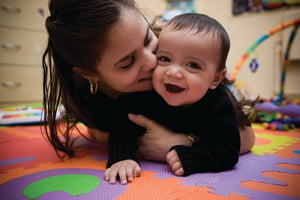Need time to do some work? Creative types of activities can last hours and are repeated often by...
"No No No"
No! No! No!
Many people reading this will think obviously, this is the language of a toddler. You are right. It is ...and it isn’t. It is the familiar voice of a toddler seeking autonomy. But it is also the familiar voice of a caregiver who says all day long, “no running, no whining, no candy before dinner, don’t hit your sister, and don’t talk with your mouth full.” To a child this constant barrage of “no” and “don’t” can feel like an assault. Your child may think, “I can’t do anything right.” And they may give up trying.
It is understandable. We want to help our children act in a way that is socially acceptable. We want them to have friends, succeed at school, be healthy and make us proud. But too many negatively phrased statements are harmful. They can destroy a healthy desire to try or take a risk. Too many negatives hurt effort, growth, and self-esteem.
It is difficult but shifting the phrasing to positives can make a world of difference. I have children who run down the hall on the way to my office. I used to say, “No running.” Now in a firm voice I call out, “Walking feet.” If your child does not know “walking feet” you teach the expectation first. Explain to them that you love them and don’t want them or others to get hurt.
Instead of “No drawing on the table,” insert a piece of paper between crayon and table and say, “Draw on paper only.” Instead of “Don’t hit your sister,” say “Use your words.” When your child follows your positive statements, you show you noticed by giving praise. Thank you for using the paper, your words, etc.
The first step is to truly listen to yourself. Write the phrasing you use with your child on paper. Ask, “How do I turn these into statements that express the behavior I want to see? How do I make this positive?” And don’t forget to use your praise to let them know you appreciate their effort and caring.
Next week’s blog concerns praise.




